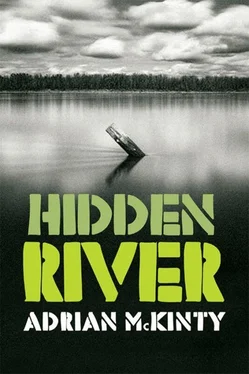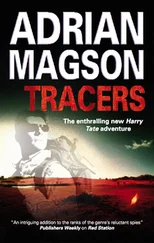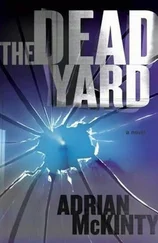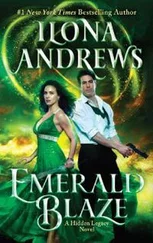“Aye, whatever they threaten you with, Lawson, it’ll be a thousand times worse if you ever fuck us over. Remember that. You’d be dead if you weren’t such a fuckup. You owe us. You owe us. We’ve been lenient. We could kill you now. We could do anything we like, Lawson. Do you understand? Do you understand?” Flat Cap said.
“I understand,” I gasped, shaking.
“Says on your file you’re Jewish, not even Protestant at all. Is your loyalty a question we should be worrying about?” Baldy said.
“No,” I spat, somehow managing to answer this humiliating question.
“Hope fucking not. You’re a fucking sorry excuse for a human being,” Baldy said.
“Aye, he is, but he gets it. Good. Stop the vehicle,” Flat Cap commanded.
“Stop the vehicle,” the big guy yelled to the driver.
The Land Rover stopped. Through the armored windows I could see that we were in the middle of nowhere. They uncuffed me, pushed me out the back of the vehicle. I stumbled and fell.
“Think about it. We know where you live, we know everything you do, we know everyone you fucking see,” Baldy said, closing the door.
The Land Rover drove off in a slew of mud. I got up and brushed myself down. Smiled. The icing on the cake. If I didn’t cooperate with Douglas, he’d have me arrested. If I did cooperate, the RUC would at the very least release my confession. Worse. Get me, get Da. Or that age-old drama. A car, a gun, a struggle, a field far from anywhere, a bullet in the neck…
I got my bearings. They had dumped me way up Empire Lane. I calmed myself. Walked down the hill. My wrists hurt. I went past the big, asymmetrical Patawasti house. Farther down. The rich neighborhood giving way to the poor. Council houses, bungalows. A bonfire being built for the twelfth of July holiday.
My house. Kitchen. Da gone campaigning. I tried to find something to drink but there was nothing. What to do? Escape? Go to Douglas? Borrow some dough? I racked my brain but couldn’t come up with anything.
I picked the bills from off the hall floor. Final demands on electricity, oil heat, ground rent. Place was a mess. Ma would have cleaned it. Made Da clean it when she was sick. Ma. Jesus … What the hell was I going to do? I needed to think but I couldn’t do ketch again today. Twice in one day. Never. Back to the kitchen, opened the fridge.
The phone rang. I picked it up. It was Mrs. Patawasti. She asked if I had been up Empire Lane this morning near their house. I said I had. She said that Mr. Patawasti had come out after me, but his knees were bad, couldn’t keep up. She said that they would very much like to see me. Would this afternoon be convenient? I said it would.
I hung up the receiver. It didn’t take a genius to see what they wanted. All the pieces were there now. I would never have gone to America. I knew Victoria and I loved her and I was sorry that she was dead, but I had given up police work forever. I had failed in that aspect of my life and it was only heroin that kept me together at all. I had not, like so many RUC officers, put a bullet in my own brain. Detective work had destroyed me. Why had I resigned from the police? Because I had unearthed the case, because I had broken the case. The truth had imprisoned me, not set me free.
But everything had come together, leaving me one way out. The British cops were down on my neck, the Irish cops were on my head. I had to run. But it was all of it. The boat. The drugs. The quiz. Spider. And now the murder case. That English peeler was just the stoker, the driver of this great derailing train. And within a week we were in America.
Aye, within a week we were in America, we had killed a man, fucked up the case, and were on the run there, too.
Two days after her murder, Victoria’s brother Colin had flown to Denver to pick up her effects. The murderer was already caught. The case was open and shut. Nearly half of all murders that are solved are done so within the first twenty-four hours. The Denver police had a known criminal in custody. His Mexican driver’s license had been found in Victoria’s room. In the U.S. he had previous convictions for theft and burglary. He wasn’t particularly bright — he had been arrested by the police at his brother’s house. The police had assured Colin that they had their man, that prosecution would be easy, that he could go home with at least the thought that Victoria’s killer would be brought to book. And that since the murder was committed during the commission of another crime, he might even get the death penalty.
The Denver police had an air of competence that impressed Colin and he was convinced. In violation of the rules, the cops took him to the jail to see the man who had killed his little sister. After that, Colin drove the forty-five minutes to Victoria’s office in Boulder, Colorado. He got a great deal of sympathy. She had been well liked. She worked for a nonprofit called the Campaign for the American Wilderness. A charitable organization that explored new ways of looking at environmental policy. A very successful group, so successful, in fact, that they were moving out of their Boulder headquarters to a shiny new office in downtown Denver. Victoria had been in charge of many aspects of the Denver move and it was difficult without her. Everyone had been sweet and kind, especially the copresidents of CAW, Charles and Robert Mulholland. Charles and his wife, Amber, took Colin to the Brown Palace Hotel and bought him lunch.
Colin gathered Victoria’s effects and gave them to a thrift shop. No will had been found, but, of course, Victoria had only been twenty-six. The cops released the body. Colin met with an undertaker and they flew her home.
Four days after Victoria Patawasti’s funeral, on June 16, Mr. Patawasti received a letter with a Boulder postmark. It was slightly faded, computer printed (rather than typed), and said simply:
Don’t let him get away with you’r daughter’s murder.
A lead. Revealing something about the sender, but the family didn’t know that and the local peelers hadn’t seen it either.
The family called Carrickfergus RUC. A Constable Pollock came to see them. He checked for prints, found nothing, held the note up to the light, found nothing, and on that basis somehow decided it was probably the work of a crank. After all, didn’t the Americans already have the murderer in custody? America was full of cranks. They should throw the letter out, burn it.
Mr. Patawasti was an Oxford graduate, a professor; Constable Pollock’s analysis did not satisfy him.
He called up the Denver police and after a great deal of trouble got through to the investigating officer. Detective Anthony Miller. Detective Miller assured Mr. Patawasti that they had their man and that everything was under control. Of course, he could send the letter to them and they would add it to the investigation, but really the Northern Irish police were probably correct, it sounded like a crank.
Mr. Patawasti had seen me at the funeral, talked to Dad, had a think….
A phone call. A change of clothes. Shirt, tie, jeans, Doc Martens. Mr. Patawasti’s house on Empire Lane. That big house from the 1930s. The two wings. The Gothic tower. The servants’ steps. The massive front garden with a lawn and roses. A view down to Belfast Lough. On a clear day you could probably see parts of Scotland.
Doorbell, living room: Mrs. Patawasti, Colin, Stephen, Mr. Patawasti.
Stephen, six years older than me; Colin, four. I knew them both vaguely from school. Stephen had been captain of the rugby team. Colin had been head boy and a prefect who had given me lines and detention at least a dozen times. Even now he intimidated me.
The living room. Pictures of her: playing hockey for Carrickfergus Grammar School, matriculating at Oxford, with the family in front of the Red Fort in Delhi, dressed in a sari and stepping out of an Indian river. The rest of the room was academic, tidy, scrubbed. A bookcase, framed cricket posters, shining surfaces.
Читать дальше










